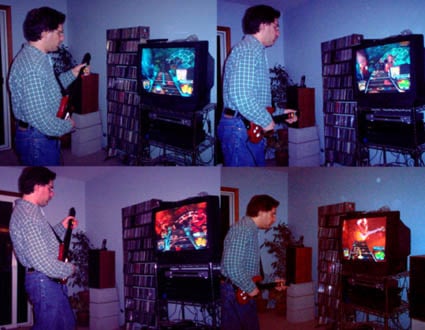Rock and roll is a vicious game

“Is that for your kids?” asked the Sears dude as he handed me the box. “Uh, my kids?, heh heh, it’s for me!” I managed as I headed out of the online-order-pickup station. [Yeah, Sears.com actually has something in their store if their website says they do; unlike Circuit City that shows an item available when you look on their website but when you visit their store it’s not on the shelves and if you can find a human who’s willing to help you, all you’ll hear is that they don’t have it. You lost a customer, Circuit City!]
Just last week I saw leaked footage (since pulled down) of an upcoming video game called Rock Band where a group of people perform a song (using guitar controllers, a drum accessory, and a microphone) and it just gave me chills. I realized I needed to get Guitar Hero, the existing predecessor.
I grew up playing video games. As a kid, we’d find any bowling alley or arcade and spend hours pumping in quarters. I used to hang out a dry cleaners (!) after school, playing whatever game they had. I got an ATM card and moved my bank account just so I could go next door to get $5 at a time in this afterschool activity. So why was I not doing it still? I had a PSX for a while; it was amusing, but it never really fit.
But this – the idea of a game that was about performing…I’d been hearing about it for a long time; stumbling across the video and subsequent conversation with friends was the motivational tipping point for me.
Wow.
The game is fun. It’s really really fun. This is an innovation around the notion of what a video game can be. Musical and performing games have been appearing for many years, such as PaRappa the Rapper, and Dance Dance Revolution, or the various precursors of Guitar Hero that one could find in a Tokyo arcade 5 years ago.
The idea of the game isn’t new, but is definitely novel. You hold a guitar, with five different buttons where frets would be. Instead of strings, there is a strumming bar. On screen, notes come towards you on a fretboard. When the note gets to the bottom, press the corresponding button on the fretboard and strum, zapping the note. Each level is a different song and the notes that play (or don’t, if you miss) as you zap ’em make up the guitar parts of the song. You are essentially playing the song, with enough realism that you get a real charge out of it.
Some nice touches make it really work. There is a great tutorial that explains how to play and how to use the controller. No need to page through the tiny print in a book and figure out what the heck is going on; they’ve designed an explicit learning interface.
As well, there are various levels, to enable you to have some success. We played on Easy, and it was tough at first, then become somewhat less tough with practice. And more fun, the better we got. We dabbled with the Medium setting and it was more fun to play. This blew me away. Instead of simply increasing the challenge (more monsters, smarter monsters, faster moving monsters), the game gives back more. The more intricate the pattern of notes you are sent, the closer you are to “playing” the song. It’s more fun and more engaging.
There’s a nice mode where you can go through any of the songs at a variety of slower speeds and practice the guitar parts. The songs are broken down into intro/chorus 1/verse 1/bridge/solo etc. so you can really focus on what you are trying to learn.
This is the best game I’ve ever seen and it’s a really nice implementation of some fresh thinking about what video games can enable.
We were amused to see the game featured in the New York Times today (although they referred incorrect to Stevie Ray Vaughan’s “Texas Flood” as “Texas Blood.” Nice).

Finally, the SF Chron featured this image, full-size, on their real estate supplement.

Kids? Sheesh. This is the perfect game for my generation, young Sears dude.